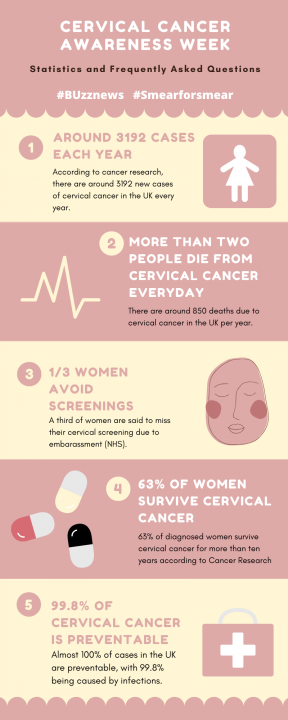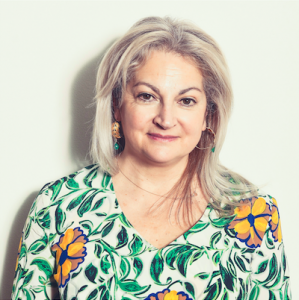Cervical Cancer Awareness week is an annual event held across the UK in a bid to raise awards for the almost wholly preventable disease.
It aims to encourage the estimated 3 million women across the UK who haven’t had a smear test in the past three and a half years, to get tested.
Dorset charity GO Girls have launched a campaign focused on encouraging young girls to get the HPV (Human Papillomavirus) vaccine as part of Cervical Cancer Awareness week.
Recent figures have shown that the number girls opting to have the vaccine has decreased over the years so this year’s efforts are focused on raising awareness of the benefits of the vaccine. To assist their campaign they have created an animation, which they hope to circulate around schools.

The Eve Appeal has also launched their own campaign for this week. They are the leading UK national charity funding research and raising awareness into the five gynaecological cancers – womb, ovarian, cervical, vulval and vagina.
This year, the charity has launched their ‘For Everyone with a Cervix’ campaign which aims to bridge the information gap in cervical cancer information for transgender, non-binary and intersex communities.
Additionally, the charity has published some tips for healthcare professionals to better support their patients from the aforementioned communities.
Buzz news interviewed CEO of The Eve Appeal, Athena Lamnisos, about this year’s campaign.
Q&A Athena Lamnisos, CEO, The Eve Appeal

Q: This year, why did the Eve Appeal feel that it was a necessary time to launch the campaign aimed at transgender, non-binary and intersex communities?
A: We start from a point of inclusion and want everyone to have access to the information and support that they need to look after their health and access cancer screening and prevention services.
Cervical screening tests can be uncomfortable and awkward for anyone, but we know that for certain communities there are even more barriers, where they can be physically and emotionally painful. We also know that for some there’s a clear information and knowledge gap – they don’t know if they should be attending screening or how to access it.
The trans, non-binary and intersex communities being one of them. It can be difficult to even acknowledge that part of their body, never mind having a stranger performing an invasive procedure. We want to help reduce the barriers for everyone and we feel the time is now. There is currently very little specific information and we hear story after story about barriers to access. We wanted to fill in this gap to make sure there is information out there for health care professionals and also the community.
Q: For transgender communities who feel uncomfortable visiting their GP or local hospital for a smear test, are there any alternatives which are more sensitive towards their gender?
A: There are a few LGBTQ+ specialist clinics, and some have a cervical screening clinic, which will provide a very supporting and accessible environment to go for your cervical screening. It is worth looking into whether you have any near you which you can go to if you are worried about going to your local GP. You can also speak to our specialist gynaecological nurse service, Ask Eve about any concerns before an appointment, or any of the fantastic support charities out there for the trans community.
Q: Will cervical cancer always be a risk for transgender males?
A: Cervical cancer is a risk for a trans man if he has a cervix. If he has had some genital gender reassignment surgery (bottom surgery), he may have had his cervix removed and no longer be at risk. It is important if you are going for surgery to talk to your consultant about what anatomy will remain so you can know your cancer risk, and know whether or not you need to go for cervical screening. We have produced some tailored information on each of the five gynae cancers which can help. It is important to remember, that regardless of any surgery you have had, if you are a trans man you will still be at risk of vulval and vaginal cancer as in all gender reassignment surgeries this tissue is kept, these cancers are rare so the risk is low, but it is still here and important to be aware of.
Hillary Maxwell, Chair and Gynae-Oncology Clinical Nurse Specialist, also spoke to BUzz about this years campaign and why it is important to raise awareness for cervical cancer and the HPV Vaccination.


 Witness appeal following theft of furniture from pub in Poole
Witness appeal following theft of furniture from pub in Poole